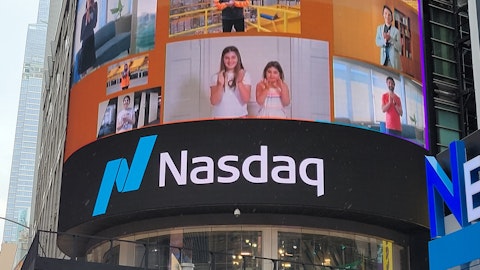In this article, we discuss 10 buy-the-dip stocks to buy according to billionaire Ken Fisher. If you want to skip our detailed analysis of Fisher’s stock selection and the current sell-off in tech, go directly to 5 Best Buy-the-Dip Tech Stocks According to Billionaire Ken Fisher.
The tech-heavy Nasdaq Composite is down 27% in 2022 so far, signaling the worst start to a year since crisis-ridden 2020. Mega-cap stocks like Amazon.com, Inc. (NASDAQ:AMZN), Meta Platforms, Inc. (NASDAQ:FB) and Alphabet Inc. (NASDAQ:GOOG) are down 36%, 42.6%, and 22.44% in the year to date, respectively. But why exactly are investors selling out of mega growth tech stocks that have been Wall Street’s darlings for so long? The answer lies in the current macroeconomic situation, where rising interest rates, sky-high inflation, and geopolitical uncertainty has investors shifting their money towards safe haven assets. These include dividend-paying energy stocks, banking and financial sector companies expected to do good even during a recession, and gold, as evident by gold prices touching multi-year highs in February as the Russian invasion of Ukraine unfolded. Investors right now are scared of putting their money into the technology sector, fearing the sell-off may not be at bottom yet.
This is because consumers are under a crunch, says Megan Horneman, chief investment officer at Verdence Capital Advisors. People have started to pay for food and energy bills with credit cards, she says, on account of inflation touching 40-year highs in the United States. The CPI (Consumer Price Index) jumped 8.3% in April, above the estimated figure of 8.1%. Retail giants Target Corporation (NYSE:TGT) and Walmart Inc. (NYSE:WMT) both reported disappointing Q1 results, citing higher fuel and labor costs. In such a climate, it is understandable why some would want to pull their money from tech stocks and instead focus on safer bets.
Not everybody is riding the same wave of anxiety when it comes to the tech sector. Dan Ives, managing director at Wedbush Securities, believes the current tech sell-off is not worse than the dot.com crash in 2000, and in fact presents a ‘generational buying opportunity’ for the right stocks that could earn investors huge returns in the coming years. He notes that secular trends in the cybersecurity, cloud, artificial intelligence and semiconductor industries in the next few years have the potential to transform the global economy, through what he sees as the 4th Industrial Revolution.
As a famed investor with decades of experience running one of the most successful hedge funds on Wall Street, it’s obvious that Ken Fisher would know which tech stocks to buy at discounted prices. He increased his stakes in multiple tech stocks in the first quarter of 2022. The billionaire’s Fisher Asset Management has $169.5 billion in assets under management (AUM), with a total of 952 stocks. In the first quarter, he made 99 new purchases, increased his position in 442 equities, completely disposed off 89, and reduced holdings in 385 stocks. The top 10 holdings of the firm comprise 31.34% of its total portfolio.

Our Methodology
Ken Fisher’s portfolio for the first quarter of 2022 was examined to find 10 tech stocks that are significantly down in the year-to-date or the last 12 months, and in which the billionaire recently increased his stake.
Best Buy-the-Dip Tech Stocks According to Billionaire Ken Fisher
10. NVIDIA Corporation (NASDAQ:NVDA)
Number of Hedge Fund Holders: 110
Fisher Asset Management’s 13F Portfolio: 1.17%
Fisher Asset Management’s Stake Value: $1.99 billion
NVIDIA Corporation (NASDAQ:NVDA) kicks off the list of 10 buy-the-dip tech stocks to buy according to Ken Fisher. As of May 19, the stock is down 43.15% in the year to date, but Fisher Asset Management increased its position in the firm by 44% in the first quarter of 2022, thereby consisting of 7.32 million shares worth $1.99 billion. This represented 1.17% of the fund’s total portfolio.
California-based NVIDIA Corporation (NASDAQ:NVDA) deals in the development of computer graphics processors and chipsets used in a range of smart devices. Morgan Stanley analyst Joseph Moore in early May resumed coverage of the firm with an ‘Equal Weight’ rating and $217 price target. Although NVIDIA Corporation (NASDAQ:NVDA) remains one of the best growth stocks in the semiconductor space, the analyst is concerned about its high valuation in comparison to peers and a deceleration in its gaming business. He sees a “modestly challenging” 2023 for the firm that should be balanced by its strong exposure to the data center CPU business.
Hedge funds were seen loading up on NVIDIA Corporation (NASDAQ:NVDA) stock, given its dominant position in the semiconductor space which has seen continuously growing demand. 110 hedge funds reported bullish bets on the company shares at the close of Q4 2021, in comparison to 83 hedge funds in the previous quarter.
Here is what investment firm RiverPark Funds had to say about NVIDIA Corporation (NASDAQ:NVDA) in its Q1 2022 investor letter:
“Nvidia is the leading designer of graphics processing chips (commonly known as GPU’s- graphics processing units), required for powerful computer processing. Over the past 20 years, the company has evolved through innovation and adaptation from a predominantly gaming- focused chip vendor to one of the largest semiconductor/software vendors in the world, dominating the core secular growth markets of gaming, data centers and professional visualization. Over the past decade, the company has grown revenue at a compound annual rate of over 20% while expanding operating margins and, through its asset light business model, producing ever increasing amounts of free cash flow. For 2021 the company generated 61% revenue growth to $27 billion, expanded its EBITDA margins to over 44% and generated over $8 billion of free cash flow. Over the past five years, the company has generated a cumulative $23 billion of FCF after cumulative capital expenditures of less than $4 billion.
We expect future growth to remain robust as NVDA chips and software are critical to many of the core technologies being adopted globally, including cloud computing, virtual reality and advanced artificial intelligence. As with NFLX, we took advantage of the over 40% recent drop in the company’s shares over the last several months to initiate a small position.”
Along with Amazon.com, Inc. (NASDAQ:AMZN), Meta Platforms, Inc. (NASDAQ:FB), and Alphabet Inc. (NASDAQ:GOOG), NVIDIA Corporation (NASDAQ:NVDA) is a trending tech stock in the portfolio of Ken Fisher.
9. Netflix, Inc. (NASDAQ:NFLX)
Number of Hedge Fund Holders: 113
Fisher Asset Management’s 13F Portfolio: 1.4%
Fisher Asset Management’s Stake Value: $2.38 billion
Netflix, Inc. (NASDAQ:NFLX) is a streaming platform which offers entertainment content through a subscription-based model. It has approximately 220 million paid users, making it the largest streaming platform in the world. Ken Fisher was the most prominent shareholder of Netflix, Inc. (NASDAQ:NFLX) in the first quarter of 2022, with 6.35 million shares worth $2.38 billion, representing an increase of 18% in holding over the previous quarter.
On May 16, Wedbush analyst Michael Pachter upgraded Netflix, Inc. (NASDAQ:NFLX) ‘Outperform’ from ‘Neutral’, with a $280 price target. He noted that investor confidence in the firm will restore and it will see subscriber growth as soon as it tries to focus on reducing the churn rate by releasing new content over several weeks. He sees the company shares offering an attractive buying opportunity at current levels. In Q1 2022, the company reported losing subscribers for the first time in a decade, pointing towards slowing growth amid market saturation in the streaming space.
For the first quarter, Netflix, Inc. (NASDAQ:NFLX) reported earnings per share of $3.53, above expectations by $0.61. Revenue of $7.87 billion was below analysts’ estimates by $75.6 million.
Investors were seen piling into Netflix, Inc. (NASDAQ:NFLX) shares at the end of the fourth quarter, where 113 hedge funds held positions in the firm, in comparison to 106 hedge funds a quarter ago.
ClearBridge Investments, an investment firm, talked about Netflix, Inc. (NASDAQ:NFLX) in its Q1 2022 investor letter, stating:
“After being a prime beneficiary of increased viewing patterns during the stay-at-home period of COVID-19, Netflix is recalibrating what a normal growth trajectory will look like as global economies fully reopen. The stock fell sharply after the company modestly reduced its net subscriber additions for the current quarter, calling into question its ability to continue to deliver double-digit subscriber growth.
We believe one of our edges as active managers is our long-term orientation and willingness to be both early and patient with additions to the portfolio. With Netflix, we remain convinced that our thesis for owning the stock is intact. While some fear the U.S. streaming market is becoming saturated, Netflix’s penetration of global broadband homes is still less than 50%, a figure that doesn’t even include the opportunity to attract more mobile-only smartphone users.”
8. Meta Platforms, Inc. (NASDAQ:FB)
Number of Hedge Fund Holders: 224
Fisher Asset Management’s 13F Portfolio: 1.46%
Fisher Asset Management’s Stake Value: $2.49 billion
Ken Fisher increased his stake by 17% in Facebook’s parent company Meta Platforms, Inc. (NASDAQ:FB) in the first quarter of 2022. The billionaire held 11.19 million shares of the firm as compared to 9.58 million shares in the fourth quarter of 2021. The total number of bullish hedge fund bets on the company shares stood at 224 at the close of Q4 2021, down from 248 a quarter ago.
In late April, Evercore ISI analyst Mark Mahaney maintained an ‘Outperform’ rating on Meta Platforms, Inc. (NASDAQ:FB) shares and decreased the price target to $325 from $350. He sees the firm facing three key issues, namely competition from rival Tiktok, ad platform impairment owing to Apple’s privacy changes, and monetization challenges related to Reels. However, he is confident the firm can address them successfully and thinks shares present a “truly compelling” buying opportunity at current levels. Shares of Meta Platforms, Inc. (NASDAQ:FB) are down 43.50% in the year to date as of May 19.
Meta Platforms, Inc. (NASDAQ:FB) posted an EPS of $2.72 for the first quarter, exceeding estimates by $0.21. Quarterly revenue stood at $27.9 billion, below analysts’ forecasts by roughly $314 million.
Investment firm Vulcan Value Partners mentioned many stocks in its Q1 2022 investor letter, and Meta Platforms, Inc. (NASDAQ:FB) was one of them. The fund said:
“Meta Platforms Inc., the parent company of Facebook, reported excellent operating results in 2021. Its revenue increased 37%, operating earnings increased 40%, and the company generated $40 billion of free cash flow. Despite these excellent results, Meta experienced extreme volatility in its stock price during the first quarter. We believe that two factors are responsible for this volatility. First, the company quantified the headwind to revenue from Apple’s recent privacy changes in the amount of approximately $10 billion for 2022. Meta is rebuilding its advertising technology, and we believe the long-term headwinds from Apple’s privacy changes will be limited because Meta will create a suitable solution. Second, Meta continues to invest heavily into its Reality Labs segment, also known as the metaverse. While we believe the metaverse presents great opportunity for Meta, we are not assigning any value to it in our valuation work. While 2022 may be challenging for Meta, the company’s competitive advantages are still intact, and the company trades at a significant discount to our estimate of its intrinsic value. Despite our concerns about a possible recession, we expect Meta to return to double-digit bottom line growth next year.”
7. Advanced Micro Devices, Inc. (NASDAQ:AMD)
Number of Hedge Fund Holders: 69
Fisher Asset Management’s 13F Portfolio: 1.57%
Fisher Asset Management’s Stake Value: $2.66 billion
Advanced Micro Devices, Inc. (NASDAQ:AMD) is a semiconductor firm based in California which manufactures a range of processors, chips and integrated graphics processing units (GPUs). Even though the firm enjoys strong fundamentals, tightening monetary policy in the United States and supply chain issues has led to a decline in recent months. The stock is down 40% from its November 2021 high of $161 per share, currently trading around $96 as of May 19.
Billionaire Ken Fisher bought the dip in Advanced Micro Devices, Inc. (NASDAQ:AMD) shares during the first quarter, reporting a stake worth $2.66 billion which consisted of 24.38 million shares. This was an increase in holding of 23% over the previous quarter, where Fisher owned 19.96 million shares of the semiconductor firm.
On May 17, Piper Sandler analyst Harsh Kumar upgraded Advanced Micro Devices, Inc. (NASDAQ:AMD) to ‘Overweight’ from ‘Neutral’, with a price target of $140, up from $98. The analyst urged investors to “buy good companies when they are down”, noting that AMD’s mid-to-long-term catalysts remain intact amid strong server trends, strong semi-custom trends, and growth in commercial PCs offsetting weakness in consumer PCs.
For the first quarter, Advanced Micro Devices, Inc.’s (NASDAQ:AMD) revenue stood at $5.89 billion, signaling a boost of 70.89% from the year-ago quarter and beating estimates by $313.4 million. EPS was reported at $1.13, above consensus estimates by $0.20.
Of the 900+ elite hedge funds in the database of Insider Monkey, 69 were long Advanced Micro Devices, Inc. (NASDAQ:AMD) shares at the end of December. This shows improving investor confidence in the firm, as 65 hedge funds reported ownership of stakes in the firm at the end of September.
Investment firm Carillon Tower Advisers had this to say about the prospects of Advanced Micro Devices, Inc. in its Q4 2021 investor letter:
“Advanced Micro Devices (AMD) supplies semiconductor chips for central processing units (CPUs) and graphic processing units (GPUs). The firm has been gaining share against its primary competitor in the datacenter server CPU space, as this rival has been unable to match the design and manufacturing capabilities of AMD and its partners. Investors are also looking forward to the closing of the previously announced merger with a semiconductor manufacturer that is another one of the portfolio’s holdings. The merger will increase AMD’s capabilities in the Field Programmable Gate Array (FPGA) chip space, and the combined company should possess the potential to win additional market share in the datacenter chip market.”
6. Taiwan Semiconductor Manufacturing Company Limited (NYSE:TSM)
Number of Hedge Fund Holders: 72
Fisher Asset Management’s 13F Portfolio: 1.61%
Fisher Asset Management’s Stake Value: $2.73 billion
Taiwan Semiconductor Manufacturing Company Limited (NYSE:TSM) is the largest semiconductor foundry in the world, manufacturing chips for companies such as Apple, Sony, Nvidia and AMD, among others. According to his Q1 2022 portfolio, Ken Fisher owned 26.18 million shares of the firm at a value of $2.73 billion, signaling a 1% jump in holding over the previous quarter.
Shares of Taiwan Semiconductor Manufacturing Company Limited (NYSE:TSM) are down 30% in the year-to-date, giving investors an excellent opportunity to buy the company known as the ‘backbone’ of the global semiconductor industry.
On April 4, Morgan Stanley analyst Charlie Chan named Taiwan Semiconductor Manufacturing Company Limited (NYSE:TSM) a “catalyst driven idea”, noting that he expects the firm’s Q2 guidance to surpass current consensus estimates. He gave the firm an unchanged ‘Overweight’ rating and a price target of NT$780.
For Q1 2022, Taiwan Semiconductor Manufacturing Company Limited (NYSE:TSM) posted earnings per share of $1.40, which was above consensus estimates by $0.09. Quarterly revenue jumped 32.10% year-on-year, coming in at $16.9 billion which exceeded analysts’ forecasts by $634.5 million.
72 hedge funds held positions in the firm at the close of the fourth quarter, with a combined value of $10.99 billion. This is up from 67 bullish hedge fund bets on Taiwan Semiconductor Manufacturing Company Limited (NYSE:TSM) shares a quarter ago.
Here is what Wedgewood Partners had to say about Taiwan Semiconductor Manufacturing Company Limited (NYSE:TSM) in its Q1 2022 investor letter:
“Taiwan Semiconductor pulled back on geopolitical concerns and periodic market fears about the end of the “cycle” in semiconductors. First, we think the Company might be one of the most – if not the most – important Companies in the world. Taiwan Semiconductor has a near-monopoly on semiconductor processing at advanced nodes, which makes it irreplaceable to customers such as Apple, AMD, NVIDIA, Mediatek, Amazon, and even Intel. Second, much less important manufacturers have more direct geopolitical risk than Taiwan Semiconductor, yet they trade at substantial premiums – both multiple and market cap. For example, Tesla is a heavy manufacturer of only about 1 million automobiles with significant production capacity located in the heart of China, yet it trades at double the market cap of Taiwan Semiconductor. Third, while it is hard to know when the current semiconductor “cycle” will slow or end, we see very few signs of it, as Taiwan Semiconductor continues to generate bookings well in excess of its current capacity – unlike any previous cycle. Taiwan Semiconductor traded to levels that are much too pessimistic given its competitive positioning and opportunity for growth driven by a more robust semiconductor cycle, driven by high-performance computing. As such, we added to our position during the quarter.”
In addition to Amazon.com, Inc. (NASDAQ:AMZN), Alphabet Inc. (NASDAQ:GOOG) and Meta Platforms, Inc. (NASDAQ:FB), Taiwan Semiconductor Manufacturing Company Limited (NYSE:TSM) is one of the most prominent stocks featuring in billionaire Ken Fisher’s portfolio.
Click to continue reading and see 5 Best Buy-the-Dip Tech Stocks According to Billionaire Ken Fisher.





